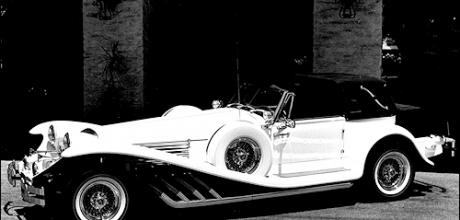1979 Matco Diamante
Richard Heseltine examines the distinctively American concept of the ‘neoclassic’ and specifically the Matco marque…
From here to obscurity
The ‘neoclassic’ is a uniquely American breed of luxury car, and one that is rarely subtle. The Excalibur established the template as far back as the mid-Sixties, but it had perhaps been eclipsed by the super-tacky Clénet by the mid- Seventies. However, just as night follows day, most of these operations don’t last long, usually because partners fall out, or the ‘talent’ jumps ship. In the case of the Matco Diamante and its instigator, Bill Mathews, it was a bit of both.
The sometime Clénet production manager departed in 1977 and set about creating his own variation on the theme. The basis for the car was a Cadillac Fleetwood Brougham chassis, with the wheelbase lengthened to 136 inches. Power came from a stock 6965cc V8 that produced a giddying 195bhp, the body including the bolton wings and running boards being moulded from glass fibre. There was also a rear lift-up ‘rumble seat’. Proprietary parts stretched to an MG Midget windscreen and surround, while the side pipes were non-functional.
While the interior was awash with GM-sourced instrumentation and switchgear, you could order one with a ‘Coupe de Roi’ hardtop and beaver or sheared vicuna carpeting, not forgetting ‘chinchilla lap robes’. Such luxury came with a hefty asking price, though. Starting out at just north of $100,000 (around $375k in new money) when launched in 1979, the Diamante struggled to find a foothold.
Given the lofty price tag, it’s hardly surprising, but 13 were sold in two years before Mathews shuttered Matco Inc.
He was far from done, though. Instead, he redesigned the car and offered it in kit form under the Mathews Motor Coach banner while retaining the Diamante model name.
Relaunched in late 1981, and produced in the same premises in Ventura, California, the DIY variant was offered initially with any post- 1977 Cadillac acting as a donor car. However, a bespoke frame that employed Cadillac, Buick and Chevrolet running gear was offered subsequently.
The brochure trumpeted, not altogether coherently: ‘The Diamante is fabricated from the best materials available and all techniques used in the manufacture of our product are the latest state of the art… It is probably one of the best engineered automobiles in the world! A very strong statement but one must evaluate the following. The Diamante does well [at] what it was designed to do. It is a well-mannered, medium performance, high luxury, high visibility, aesthetically and period correctly styled motorcar… The body is without doubt the strongest body in the Specialist Car Industry.’
Developments included a Phaeton body style, with kits starting at $7995 in basic form (that’s around $24,000 in new money). Sales continued to the mid-Eighties but as to how many were made, no production figures were ever released. Mathews then changed tack and introduced a different car, a 1932 ‘Hi-Boy’ Ford Model B hot rod dubbed the California High Boy. It was offered with a custom chassis and a range of V6 and V8 engines, but it failed to take off. The Mathews Motor Coach operation quietly closed its doors shortly thereafter.
Diamante roadster.


